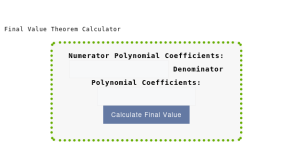Final Value Theorem Calculator
Final Value Theorem Calculator
Final Value Theorem Calculator
The Final Value Theorem Calculator is a handy tool used in control systems engineering to calculate the final value of a time-domain function based on the coefficients of the numerator and denominator polynomials of a transfer function. The final value represents the steady-state value of the system output as time approaches infinity.
Try our Polar Coordinates Calculator.
Formula:
The Final Value Theorem is based on the following formula:
Final Value = C / D
Where:
Final Valueis the steady-state value of the system output as time approaches infinity.Crepresents the last coefficient of the numerator polynomial.Drepresents the last coefficient of the denominator polynomial.
Example:
Let’s consider an example where we have the following transfer function:
G(s) = (s + 3) / (s^2 + 5s + 6)
To calculate the final value of this transfer function, we can use the Final Value Theorem and extract the coefficients of the numerator and denominator polynomials:
Numerator polynomial: [1, 3] Denominator polynomial: [1, 5, 6]
Based on the formula, we can determine the final value:
Final Value = 3 / 6 = 0.5
Therefore, for this example, the final value of the transfer function is 0.5.
FAQs:
- What does the final value represent in control systems engineering? The final value, as determined by the Final Value Theorem, represents the steady-state value of the system output when the input has reached a stable condition and time approaches infinity. It is a crucial parameter for analyzing and understanding the long-term behavior of control systems.
- In which applications is the Final Value Theorem useful? The Final Value Theorem is widely used in control systems engineering, particularly in the analysis and design of feedback control systems. It helps determine the final output or response of a system without having to go through the transient response.
- Can this calculator be used for transfer functions with higher-order polynomials? Yes, the Final Value Theorem Calculator can be applied to transfer functions with higher-order polynomials. Simply enter the coefficients of the numerator and denominator polynomials in the appropriate input fields. The calculator will automatically extract the last coefficients and compute the final value accordingly.

